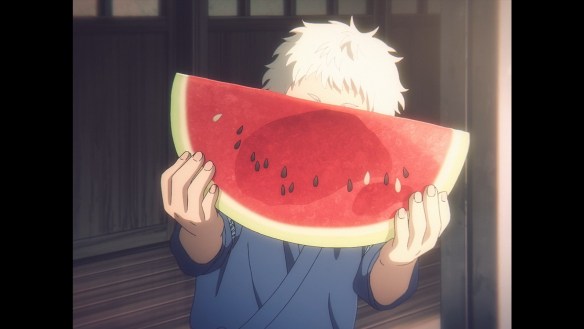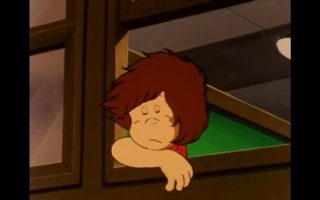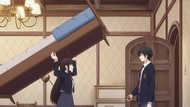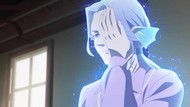Hello folks, and welcome back to Wrong Every Time. Today we are returning to the sun-speckled foothills of a rural Japanese village, whose community seems to be suffering under a sprawling yet largely undetectable curse, a malaise that announces itself first as suspicion and then paranoia, before its victims are consumed by their fear entirely. Do not look at the creatures in the woods, do not think of the flesh beneath the surface, for these are all avenues to complicity, understanding, and eventual destruction. “Mix with that too much and you won’t be human anymore,” Yoshiki’s neighbor warns him. But is being human such a laudable thing?
Yes, it is time for The Summer Hikaru Died, offering a rich stew of folk horror, rural surveillance, and queer awakening. The food is delicious, but do not ask how it’s made; that metallic tinge in the pallet, that sweetness that feels a little too familiar, these are all questions with no comforting answer. The production is situated at a classic, fertile intersection of horror and character drama, presenting occult ritual as just another manifestation of conservative cultural hegemony, and “monstrousness” as the vital rebellion of youth against such forces. And beyond this sturdy metaphor, it’s also simply an aesthetically rewarding experience, with Ryōhei Takeshita’s adaptation cleverly capturing the paranoia of Yoshiki’s town and ambiguity of the hills beyond. Let’s get back to the woods!
Episode 3
A slight sepia hue emphasizes the sense of nostalgia as we open on another flashback to Yoshiki and Hikaru’s younger days, this time with the usual cicadas complemented by open sunflowers and watermelon, two other natural touchstones of summer
“One day my friend’s dad swallowed a seed, and turned into a fully striped watermelon man.” An urban legend that has clear relevance here, as Hikaru “swallowed something” and was transformed, while Yoshiki now fears continuous contact with Hikaru’s replacement might transform him as well. It also emphasizes how easily this can happen – enjoying watermelon is one of the highlights of summer, yet one false step and you might be irrevocably changed
It is Hikaru’s dad who comforts them, once again acting as their guide to the supernatural, and their last line of defense. I imagine learning his fate will be critical to unlocking this story’s mysteries
“Denial.” A title that speaks to both Yoshiki’s overwhelming state ever since Hikaru’s death, and also his current behavior covering for Hikaru’s replacement
Once again, the lack of any warm, yellow tint in the lighting makes the summer heat feel more oppressive, like it’s bleaching the very color from the ground. It reminds me of Hiroshi Hamasaki’s style, particularly the approach he took to the seventh episode of Paranoia Agent
In the present, Yoshiki carries a watermelon over to Hikaru’s place, a gesture we can interpret as him attempting to still live in the past
But things are different now, even setting aside Hikaru’s transformation. Yoshiki is also a different person now, and his feelings towards Hikaru have become more complicated. As he arrives, quick cuts to Hikaru’s abs and neck demonstrate Yoshiki’s lustful feelings; in this moment, it is Yoshiki who wants to “devour” his friend. The show thus deliberately conflates its variable forms of possession, thereby evoking the misgivings Yoshiki must have about his own feelings
“You just gonna stare forever without waking me up?” Hikaru teases him on his obvious fascination, with a subtle implication that this Hikaru is never truly defenseless or asleep
Watermelons also work well as a visual motif for consumption – a treasure with a hard shell and delicious red flesh inside
Yoshiki mopes; he likely came here to briefly live in a memory, but it was he who first broke that memory’s spell
Hikaru’s mom is on the phone, already talking about Yoshiki’s arrival with the neighbors. Constant surveillance
The sunflowers of Yoshiki’s memories wilt to ruin in sped-up photography. He’s losing his ability to maintain this mirage, to see these days as a continuation of his life with Hikaru
“I dunno. I guess I just wanted to make sure you know how I felt.” In contrast, this current Hikaru wants to be understood, to have a relationship with Yoshiki beyond deception. They’re deliberately conflating two dawning, difficult realizations for Yoshiki: his recognition of Hikaru as a new creature, and his recognition of Hikaru as an object of desire. Through doing so, they emphasize all the more the difficult personal reassessment of realizing you yourself are “other” in some way, and that you cannot go back to the innocence and ignorance of childhood
As expected, Yoshiki then starts to reflect on how it was around the time of those watermelon memories when Hikaru’s father died
And in the same way – he went up the forbidden mountain at the same time of year, conducting some secret family ritual
Apparently their own village is so small that Hikaru was the only kid his age. So letting go of Hikaru is basically letting go of his entire childhood
The watermelon slices echo their feelings – Hikaru has boldly bitten into this new paradigm, Yoshiki refuses to touch his slice
Yoshiki finally decides to talk to the woman from the previous episode, but Hikaru notices the message
“Gettin’ punished by someone is just a way to make things easier on yourself. It makes no difference to the dead.” Harsh but crucial and kindly meant words from his contact Rie. An unexpected death always feels like a debt unpaid – like the world is out of joint somehow, and we must now correct it. Often, that comes in the form of “punishing ourselves” for letting the unthinkable happen, but such behavior is of no use to us or the person we’re grieving, and only prolongs the process of acceptance
Apparently she lost someone as well
Ooh, love this use of altered photography for illustrating the spread of Hikaru’s distortion. It seems this director is just generally a fan of manipulating traditional photography for dramatic purposes, and that interest dovetails perfectly with rural horror, where monsters are often captured as nothing more than a strange shape in the background of an incidental photo. The Ring uses this effect well, and Savagelands is essentially constructed around the ambiguous terror of an eerie, inexplicable photograph
Rie cannot leave, as her mother and daughter are still here. Even as the town dies, whether due to depopulation, land development, or the occult, there are still those who cannot see anywhere else as home
Apparently her husband was used as a shell in the same manner as Hikaru
The next day at school, Yoshiki can no longer play this game. He hides out in the classroom, hoping Hikaru will go home without him – yet at the same time, he waits in an obvious location, where Hikaru could easily find him. Still conflicted, obviously
And as expected, that’s exactly what Hikaru does. Yoshiki is presented as melting altogether until Hikaru arrives, reasserting his identity. If he is not Hikaru’s partner, what even is he?
Excellent sound design here, with the light pattering of the rain emphasizing the silence inside the room, the charged energy between them
“Is it because of me?” Once again, Hikaru consistently pursues honest communication, while Yoshiki is determined to maintain ambiguity. Understandable; to clear this ambiguity would require making a choice between rejecting or accepting this new Hikaru, and furthermore grappling with what that choice implies about Yoshiki himself
“You used to tell me everything!” “You act like that was you before!”
Hikaru actually seems more broken up by this rejection than Yoshiki. Even this new Hikaru is desperate to hold onto Yoshiki, but as usual, they’re obscuring the reason why – it could be because this creature needs a secondary host, as with Rie and her husband, or it could simply be that there is genuinely a lot of Hikaru in this creature’s identity, and just as Yoshiki feels undefined without Hikaru beside him, so does Hikaru lack stable form without Yoshiki
“I don’t know what emotions are mine anymore”
He nearly consumes Yoshiki, an almost pleasant feeling on Yoshiki’s end, before restraining himself. They are both so afraid of losing each other
“Don’t hate me,” Hikaru whimpers, revealing the strange power Yoshiki holds over him
The next day Hikaru is absent, and the rumor mill starts churning immediately, starting with Yoshiki’s own friend circle
And thus Yoshiki makes his decision at last. There is more he loves in Hikaru, even this form of Hikaru, than in the rest of this life
Hikaru is tucked under blankets in his room, his defensive posture echoing how he has no shape without Yoshiki to define him
“You’re more of a brat than Hikaru ever was.” A crucial line by Yoshiki, for the first time acknowledging and accepting Hikaru’s replacement as not just an intruder, but a separate person he also cares for
And Done
Well, the die is certainly cast now. Having wavered on the borderline between grieving Hikaru and accepting his new form, Yoshiki has finally decided that yes, Hikaru is gone, but he also cares deeply about this new Hikaru. We learned a great deal about both of them this episode, or I suppose more precisely all three of them, with new-Hikaru demonstrating a great deal of vulnerability in the face of potentially losing his connection with Yoshiki. That in turn plays nicely into the whole “embracing your outsider identity within a conservative social climate” theme; this new Hikaru is less overtly villainous than simply afraid, reacting to the hatred he receives with defensive violence, but otherwise mostly desperate to be accepted. Unfortunately, humanity is also a fearful organism, and will always seek to destroy what it cannot comprehend. Our boys have some difficult days ahead of them!
This article was made possible by reader support. Thank you all for all that you do.




